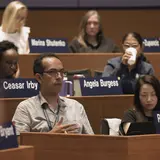
Beyond the Syllabus: Why Payment Methods Matter
In an elective course taught by Professor David Argente, students gain a grounding in the history of payment methods and evaluate emerging forms of tender, from mobile money to Bitcoin—essential skills for navigating a financial landscape in flux.
In this series, we talk to Yale SOM faculty members about how they develop and deliver innovative courses.
Course: From Cash to Crypto: The Evolution of Payment Methods
Faculty member: David Argente, Assistant Professor of Economics
The way consumers pay for goods and services has changed dramatically in the past 15 years. Electronic payment systems like Apple Pay and PayPal, peer-to-peer payment apps like Venmo, and even Bitcoin and other cryptocurrencies have emerged as competitors to cash and credit cards. These non-traditional payment methods have the potential to make transactions easier for merchants as well as customers, increase financial inclusion, and boost local economies, but they bring with them accounting complexities, new avenues for fraud, and, in the case of crypto, alarming volatility and even environmental damage.
The goal of David Argente’s elective course From Cash to Crypto: The Evolution of Payment Methods is to prepare young leaders to navigate this ever-changing terrain. The course takes students on a global tour of the financial ecosystem, with case studies related to the impact of demonetization in India, the regulation of credit cards in Costa Rica, and the success of the mobile phone-based currency M-Pesa in Africa. Along with many others, these real-world cases illustrate the impact of different payment methods in different social contexts.
Argente, who first offered the course in Spring 2024, aims to provide students with a comprehensive overview of the payment systems in use today, while also preparing them to examine and interact with new currencies that may arise tomorrow.
The course recognizes that there has been rapid evolution in payment methods around the world. We study why some payment methods are adopted over others, and what benefits and challenges they present. We don’t ask questions like, ‘Should you invest in crypto?’ It’s more like, ‘Are we ever going to use crypto to conduct transactions?’
A field in flux
Just a decade ago, Argente says, people interested in studying payment methods would have had very little research to draw on. But the increasing variety of payment methods, and their deployment in different social contexts, has created a wealth of case studies for students to use today. Argente anticipates that the course’s curriculum will change yearly to reflect new developments in the field.
All the lectures are based on the latest academic research. But, of course, researchers mainly try to understand what’s happening now or what has happened in the past. So, we leverage student presentations to study and debate about the future, from cybersecurity challenges to the role of AI and the environmental consequences of different payment methods. That part of class is where I have the most fun, because I learn a lot from the students.
Teaching and learning
Argente frequently draws on his own research in the classroom. And since payment methods impact nearly every business sector, students often contribute insights based on their own professional experience, creating a uniquely collaborative environment.
This is a course where there can be a lot of interaction between the professor and the students. A lot of them have been in different industries, so they come in with real-world experiences and food for thought. I had a student who was involved in developing new credit cards during demonetization in India. He came to class with that knowledge to enrich the discussion.
Payments for the people
Argente’s work focuses on payment methods in developing countries, especially the use of nontraditional currencies as a tool to increase financial inclusion. He has published papers on the use of Bitcoin as legal tender in El Salvador; Uber’s decision to accept cash payments in Mexico; the social costs of discouraging cash usage in Mexico; and the wide adoption of peer-to-peer payments in Costa Rica. His teaching is also guided by professional experience at the World Bank and the Bank of Mexico.
There is a great movement trying to bring people into the financial system. We have all these new technologies allowing people to get loans, invest in the stock market, and buy crypto. It’s an exciting and fruitful time for this field.
Recommended reading from the course:
- “El Salvador Adopted Bitcoin as an Official Currency; Salvadoreans Mostly Shrugged” by David Argente and Diana Van Patten, in Yale Insights
- The Curse of Cash, Kenneth S. Rogoff
- “Is the Future Cashless?” from The Pie: An Economist Podcast
- “The Incredible Rise of Chinese Fintech” from Trade Talks



